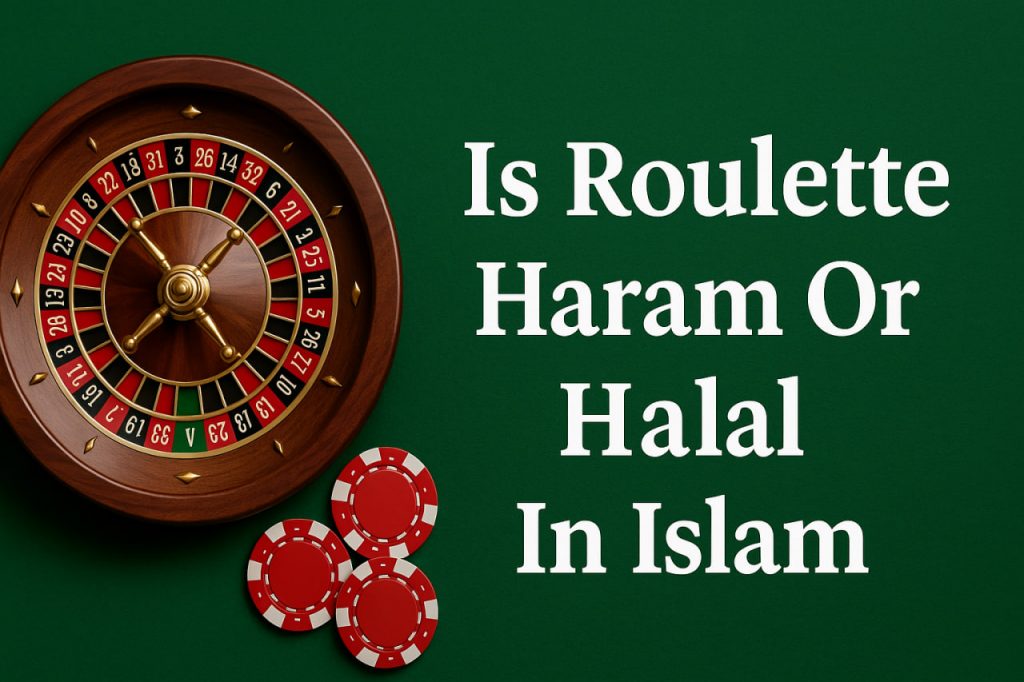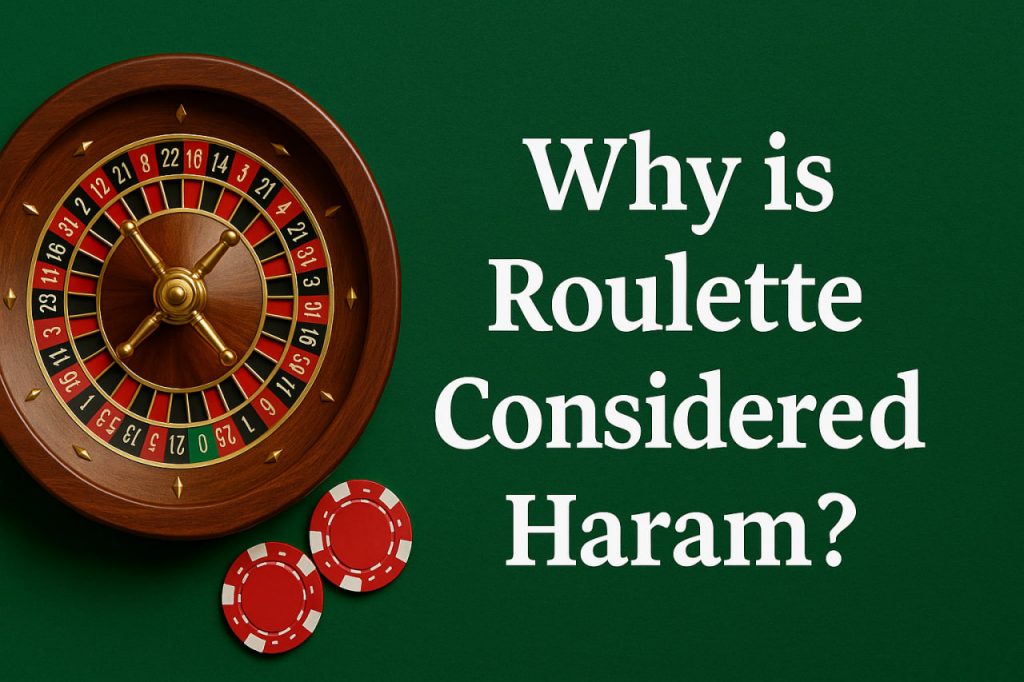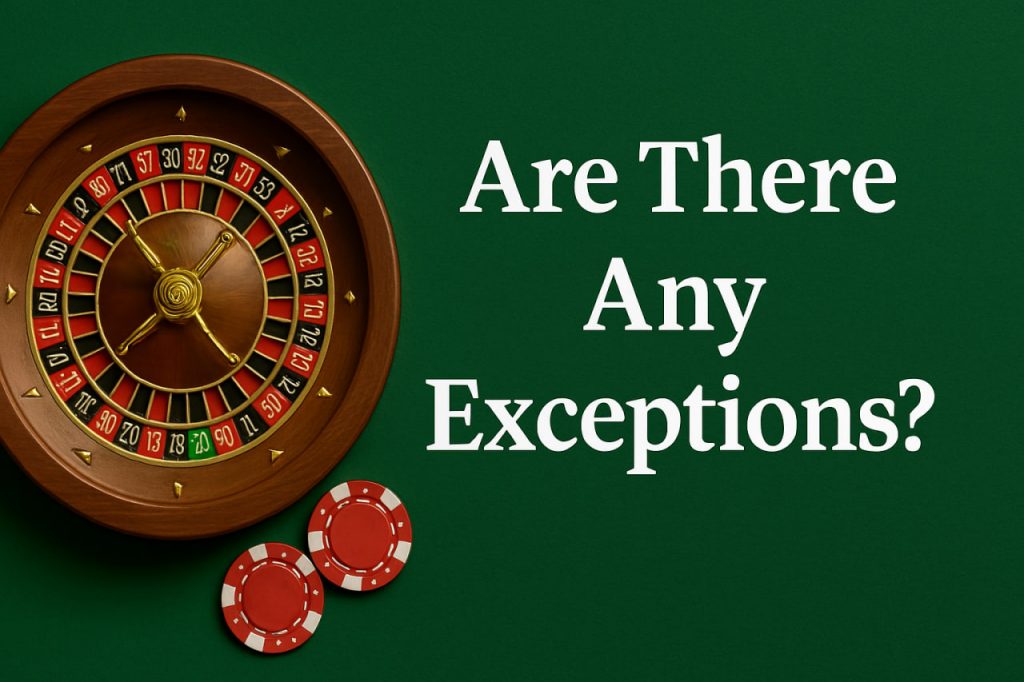Is Roulette Haram or Halal in Islam?

The question of “Is roulette haram or halal in Islam?” is increasingly being asked in today’s digital era, especially with the rapid rise of online gambling platforms, immersive casino games, mobile betting applications, and virtual casinos that are accessible 24/7. The widespread appeal, marketing tactics, and technological advancements of the gambling industry have significantly influenced younger audiences, drawing Muslims to reassess the religious and ethical boundaries of such activities. It is no longer confined to smoky back rooms or grand casino halls — gambling, including roulette, is now just a tap away.
Roulette, in particular, is frequently featured in these environments due to its simplicity, visual appeal, and the alluring promise of quick winnings. Yet, the essence of the game and its implications must be measured against Islamic principles. It is critical to assess this issue holistically — from jurisprudence and theology to behavioral science and modern technological contexts. To thoroughly address the question, we must explore what roulette entails, examine Islamic jurisprudence on gambling, consider modern-day scenarios, and understand the broader spiritual, economic, and social implications. This comprehensive guide aims to clarify whether roulette is haram or halal in Islam, based on evidence from the Quran, Hadith, and scholarly consensus.
What is Roulette?
Roulette is one of the most iconic and instantly recognizable casino games in the world. The name “roulette” is derived from the French word meaning “little wheel.” The gameplay involves players placing bets on a spinning wheel with numbered and colored slots, typically ranging from 0 to 36 in European versions and 00 in American versions.
A small ivory ball is released in the opposite direction of the wheel’s spin, and the pocket it lands in determines the winning number. Bets can be placed on single numbers, groups of numbers, odd or even numbers, or colors (red or black). Different types of bets offer different payout odds, but regardless of how you bet, the outcome is determined entirely by chance. There is no element of skill that can influence the result — all players are subject to the wheel’s randomness. Despite the game’s elegant aesthetic and perceived glamour, it is fundamentally a game of luck, not strategy or knowledge, which is a crucial point from the Islamic perspective.
Basic Islamic View on Gambling
In Islam, gambling is unequivocally considered haram (forbidden). This prohibition is not merely cultural or historical; it is rooted in divine legislation found in the Qur’an and reinforced through the Hadiths of Prophet Muhammad (peace be upon him). Gambling, whether in the form of roulette, cards, lottery, betting on sports, or any other form, is known in Arabic as maysir or qimar. These terms denote any act that involves risk of wealth or property based on chance rather than legitimate effort.
Key Quranic Verses:
- Surah Al-Baqarah (2:219):“They ask you about wine and gambling. Say, ‘In them is great sin and [yet, some] benefit for people. But their sin is greater than their benefit.'”This verse highlights that while there may be superficial enjoyment or economic benefit in gambling, its moral and spiritual costs far outweigh any advantages.
- Surah Al-Ma’idah (5:90-91):“O you who have believed, indeed, intoxicants, gambling, [sacrificing on] stone alters [to other than Allah], and divining arrows are but defilement from the work of Satan, so avoid it that you may be successful.”This powerful verse categorically places gambling alongside major sins such as idolatry and intoxication, stressing its satanic roots and destructive potential.
Key Hadiths:
- The Prophet Muhammad (PBUH) said:”Whoever says to his friend ‘Come, let’s gamble’ must give charity.” (Sahih Muslim) This Hadith illustrates the severity of gambling in Islam — even suggesting it verbally requires expiation through charity. It shows the emphasis Islam places on not even flirting with the idea of gambling.
Play Halal-Approved Roulette Selected by Our Team
Classic roulette is built around real-money gambling and profit through chance, which makes it haram in Islam. Our team has reviewed different roulette-style games and selected a Shariah-verified option that removes the betting and cash-payout elements, while keeping a safe, entertaining experience for Muslim users.
- ✔ Roulette-style game reviewed and Shariah-checked
- ✔ No real-money wagering, no gambling-based profit
- ✔ A halal-conscious way to enjoy roulette-style gameplay
Note: This halal roulette recommendation is based on our team’s Shariah analysis and is provided for educational purposes only. For personal religious rulings, please consult a qualified Islamic scholar.
Why is Roulette Considered Haram?

Roulette is not simply a leisure activity; from an Islamic viewpoint, it represents a direct form of gambling, which is strictly prohibited. Below are the comprehensive reasons why roulette is haram:
1. Element of Pure Chance
Roulette involves absolutely no skill, planning, or effort. Winning is entirely dependent on random chance, which aligns directly with the Islamic definition of maysir. Islam promotes effort-based earning and discourages all kinds of speculation.
2. Zero Productive Outcome
Unlike halal business transactions or labor, roulette offers no tangible product or service. It is a non-productive, zero-sum activity where one person’s gain is directly dependent on another’s loss, violating the Islamic concept of fair exchange.
3. Financial Harm and Exploitation
Many gamblers, lured by false hopes, lose vast sums of money. Casinos are intentionally designed with odds in favor of the house. The result is a system that thrives on people’s losses, driving them to debt, stress, and sometimes criminal activity. This undermines the Islamic principle of preserving wealth and avoiding financial oppression.
4. Moral and Psychological Consequences
Gambling is addictive. Roulette, with its quick outcomes and fast dopamine hits, often leads to compulsive behavior. It can cause stress, anxiety, and depression, while fostering a mindset of dependence and escapism. Islam encourages rationality, self-control, and mental well-being — all of which gambling undermines.
5. Destruction of Family and Community Ties
Families often suffer when a member becomes addicted to gambling. Marital discord, broken homes, and child neglect are common consequences. The emotional toll extends beyond the individual, affecting entire communities. Islam places a high value on maintaining family and community harmony, which roulette disrupts.
Halal vs Haram Characteristics in Roulette
| Criteria | Halal Characteristics | Roulette (Assessment) |
|---|---|---|
| Based on Skill or Effort | Yes | No |
| Productive Economic Activity | Yes | No |
| Promotes Ethical Behavior | Yes | No |
| Leads to Addictive Behavior | No | Yes |
| Encourages Charity | Yes | No |
| Respects Wealth Preservation | Yes | No |
| Encourages Trust in Allah | Yes | No – relies on chance, not tawakkul |
This comparison highlights that roulette possesses none of the ethical and spiritual characteristics associated with halal behavior. It is fundamentally at odds with Islamic values.
Are There Any Exceptions?
Some argue that roulette might be permissible if played purely for entertainment without involving money or material stakes — such as free apps or friendly games. However, the majority of scholars warn against this practice.

Psychological and Behavioral Risks:
- Desensitization: Even simulated gambling reduces sensitivity to its moral dangers.
- Gateway Effect: Exposure to risk-free gambling can lead to real-money gambling over time.
- Time Wasting: Time is a valuable gift from Allah. Engaging in futile games detracts from beneficial and purposeful living.
From an Islamic jurisprudential perspective, the principle of sadd al-dhara’i (blocking the means to harm) applies. If something potentially leads to haram outcomes, it is also to be avoided.
Indirect Involvement:
Islamic ethics also encompass indirect support. Even if one does not gamble, working for a gambling company, advertising roulette, or promoting gambling culture can be considered sinful. Islam calls for abstention from not just the act but the environment and culture of sin.
Scholarly Consensus and Contemporary Fatwas
Islamic scholars from all four major Sunni schools — Hanafi, Maliki, Shafi‘i, and Hanbali — unanimously agree that gambling in all its forms is forbidden. Their rulings extend to:
- Traditional casinos
- Online roulette platforms
- Sports betting
- Lottery and scratch cards
Contemporary fatwas from trusted authorities such as Al-Azhar University, Dar al-Ifta al-Misriyyah, Majlis al-Ulama, and The Permanent Committee for Islamic Research and Ifta consistently confirm that roulette — regardless of its format or platform — is impermissible.
Ethical and Spiritual Dimensions
Islam is not limited to law — it encompasses ethics (akhlaq), spirituality (tazkiyah), and social responsibility. Roulette contradicts these aspects in the following ways:
- Tawakkul (Trust in Allah): Gambling places faith in chance rather than in Allah.
- Sabr (Patience): Encourages impatience and instant gratification.
- Zuhd (Detachment from Worldly Excess): Promotes greed and material obsession.
- Amanah (Trust and Responsibility): Fails to preserve wealth responsibly.
Gambling cultivates a mindset of recklessness, distracting believers from their spiritual and moral obligations. A Muslim is expected to seek halal forms of income, protect their time, and strive toward productive, ethical engagement in life.
Conclusion: Is Roulette Haram or Halal in Islam?
In conclusion, roulette is haram in Islam without exception. It aligns entirely with the definitions of gambling (maysir/qimar) provided in Islamic sources. It encourages risk without effort, creates no value, causes personal and social harm, and runs contrary to the Islamic worldview.
If you are wondering, “is roulette halal?”, the answer — grounded in the Quran, Hadith, and scholarly consensus — is an unequivocal no. Muslims are encouraged to avoid roulette and all forms of gambling, both directly and indirectly, and to seek halal alternatives that contribute to spiritual growth, financial integrity, and social harmony.
FAQ
Traditional roulette is haram because it is entirely based on gambling, wagering money, and winning or losing through chance. These elements fall under maysir and gharar, which are clearly prohibited in Islamic teachings.
Roulette involves staking money on uncertain outcomes and hoping for profit based purely on luck. Since the result has no skill-based influence and depends only on chance, the game contains the core elements of gambling that make it impermissible for Muslims.
Roulette can only be halal if all gambling mechanics are removed. This means no real-money betting, no financial rewards, and no risk of loss. A purely entertainment-based version can be permissible if it does not resemble gambling in intention or structure.
The halal-friendly version recommended here removes money wagering, payouts, and profit-driven gameplay. It maintains the visual and entertainment aspects of roulette without including any haram characteristics related to betting or risk.
Playing a non-gambling version of roulette for entertainment can be acceptable if it does not involve money, addiction, or harmful behavior. The intention must be clean, and the activity must not lead toward real gambling.

User Reviews
I always associated roulette with haram gambling, but this site showed me a Shariah-verified roulette-style game without real betting. Now I can enjoy the experience in a halal way, which feels much more comfortable.
The halal roulette recommendation here is excellent. You clearly explain why normal roulette is haram and then guide us to a Shariah-checked alternative. Very helpful for Muslims trying to avoid gambling.
I’m really thankful for this website. It helped me stay away from conventional roulette and still enjoy a roulette-style game that follows Islamic guidelines. Great resource for practicing Muslims.
Before finding this page, I didn’t think a halal roulette option even existed. The Shariah-verified version recommended here is exactly what I needed to feel at ease while playing.